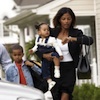

Media images of working mothers
Joanna Motro and I have begun analyses of the changing media portrayals of working mothers over the last three decades.
Using Lexis/Nexis, we have downloaded and coded over over 2000 articles from the
New York Times, the Washington Post, and the Associated Press that discuss working or at-home mothers.
Our guiding idea is that the portrayal of working mothers may have shifted in the 1990s from a concern over the effects
of working on their children to a concern over the effects of working ("trying to have it all") on mothers themselves.
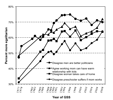
This new emphasis in the media may have played a role in
the stalled gender revolution
and especially in
the end of the rise in more feminist attitudes
in public opinion surveys.
This theory was first popularized by
Susan Faludi's 1991 book
Backlash,
although she dated the media shift to the 1980s.
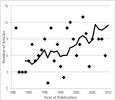

Our initial results
based on 859 New York Times articles
confirmed our expectations of a rise in "distressed working mother" themes during the 1990s
and a decline in concern for problems of children of working mothers.
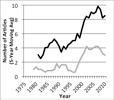 We are
extending these analyses
to investigate two related themes: "Mommy Wars" and "Opting Out".
They all show similar increases during the mid-1990s -- and some intriguing evidence of a reduction after the economic crises of 2008.
Together these themes
reinforce a cultural schema
that is consistent with lower mothers' labor force participation.
We are
extending these analyses
to investigate two related themes: "Mommy Wars" and "Opting Out".
They all show similar increases during the mid-1990s -- and some intriguing evidence of a reduction after the economic crises of 2008.
Together these themes
reinforce a cultural schema
that is consistent with lower mothers' labor force participation.
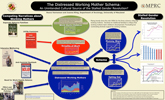 This schema bridges earlier narratives about working mothers:
it incorporates themes of choice and gender equality from feminism and child-centric themes of 1950s traditionalism -- what
Maria Charles
and
David Grusky
have called
"egalitarian essentialism".
Moreover, the distressed working mother narrative is useful for both liberal efforts to promote a more humane work/ family balance and conservative efforts to return to a 1950s family of male "breadwinners" and female "homemakers".
This schema bridges earlier narratives about working mothers:
it incorporates themes of choice and gender equality from feminism and child-centric themes of 1950s traditionalism -- what
Maria Charles
and
David Grusky
have called
"egalitarian essentialism".
Moreover, the distressed working mother narrative is useful for both liberal efforts to promote a more humane work/ family balance and conservative efforts to return to a 1950s family of male "breadwinners" and female "homemakers".
| Last updated October 1, 2016 |
|
|

